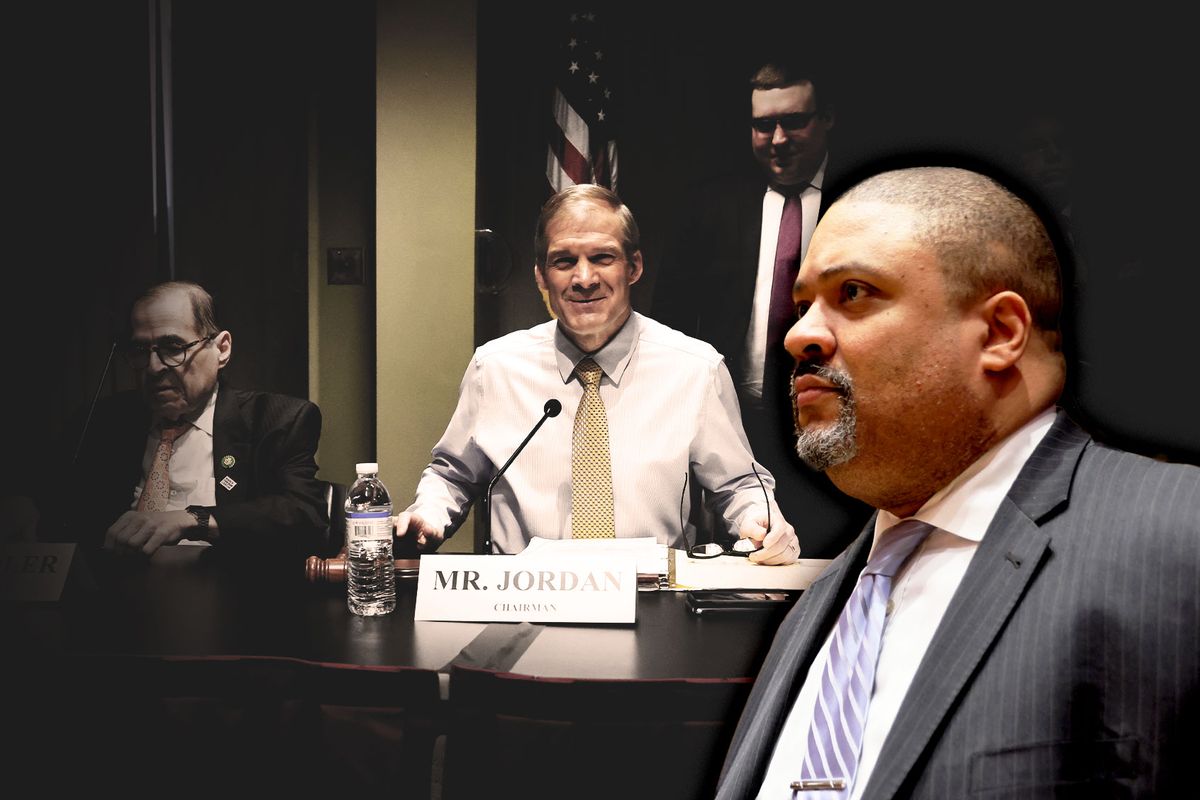A federal appeals court judge on Thursday halted House Republicans, at least for now, from questioning a former prosecutor in Manhattan District Attorney Alvin Bragg's office, in the latest round of a battle between Bragg and the GOP over the criminal investigation of Donald Trump.
Bragg has filed suit against House Judiciary Committee Chairman Jim Jordan, R-Ohio, alleging a "brazen and unconstitutional attack" on his prosecutorial powers of Trump. As previously reported by Salon, Bragg's lawyers have moved to stave off the enforcement of subpoenas by Jordan, including one sent to former prosecutor Mark Pomerantz — who at one time helped lead the Manhattan investigation into Trump — shortly after prosecutors revealed the 34 felony counts brought against the ex-president.
On Thursday, the 2nd U.S. Circuit Court of Appeals approved Bragg's request for a temporary restraining order to prevent Pomerantz from appearing before the Judiciary Committee. His deposition had been scheduled for Thursday at 10 a.m., according to USA Today.
According to the order released by the court, a three-judge panel will "consider the motion seeking a stay pending appeal of the district court's order" following written arguments from both sides.
The appeals court's decision came swiftly after U.S. District Judge Mary Vyskocil on Wednesday declined Bragg's request to temporarily block Pomerantz's subpoena. Vyskocil, a Trump appointee, wrote that the subpoena "was issued with a 'valid legislative purpose' in connection with the 'broad' and 'indispensable' congressional power to 'conduct investigations.' It is not the role of the federal judiciary to dictate what legislation Congress may consider or how it should conduct its deliberations in that connection."
Former Judiciary Committee lawyer and U.S. diplomat Norman Eisen strongly disagreed, co-authoring an amicus brief in response to Vyskocil's ruling, along with a number of former prosecutors and members of Congress. Eisen shared the brief on Twitter Thursday morning.
"The Jim Jordan subpoena, in my view overreaches, and [intrudes] upon activities of the Manhattan DA that are far far beyond the lawful purview of Congress." Eisen told Salon. "The situation here is exacerbated by the obvious motive of interference on behalf of a political ally, Donald Trump. Jordan and the other members of the MAGA caucus in the House have made no secret of that."
Want a daily wrap-up of all the news and commentary Salon has to offer? Subscribe to our morning newsletter, Crash Course.
In her ruling, Vyskocil also stated that she "does not endorse" either Bragg or Jordan and the House Judiciary Committee's agendas nor was it her place to consider them, according to CNN. She appeared to endorse the view that this was a "political dogfight," noting that Bragg is "an elected prosecutor in New York County with constituents, some of whom wish to see Bragg wield the force of law against the former President and a current candidate for the Republican presidential nomination." Jordan, she added, "has initiated a political response to what he and some of his constituents view as a manifest abuse of power and nakedly political prosecution, funded (in part) with federal money, that has the potential to interfere with the exercise of presidential duties and with an upcoming federal election."
Jordan, who subpoenaed Pomerantz to question him about Bragg's investigation of Donald Trump, has argued that Bragg is pursuing a political prosecution. Bragg argues that House Republicans are defending Trump by interfering with his criminal case.
As the clash between Bragg and Jordan continues, Congress is considering Republican-led legislation that would change how criminal cases against former presidents are carried out, according to committee lawyer Matthew Berry.
One bill would prohibit the use of federal funds in the investigation of presidents, while another would require criminal cases involving a former president to be resolved in federal courts, ABC7NY reports. Both come in the wake of Trump's indictment.
Eisen told Salon that Jordan and the House Judiciary Committee are proving their ulterior motives in "the excuses they put forward."
"They say they want to investigate the spending of federal money but no federal money was spent on this prosecution," he said. "They say they're interested in passing legislation to protect future presidents from state prosecution, but they don't need to hear from Mr. Pomerantz to pass that legislation." The true reason for the subpoena, he concluded, was "abundantly clear."
Read more
on Alvin Bragg and the Trump prosecution



Shares